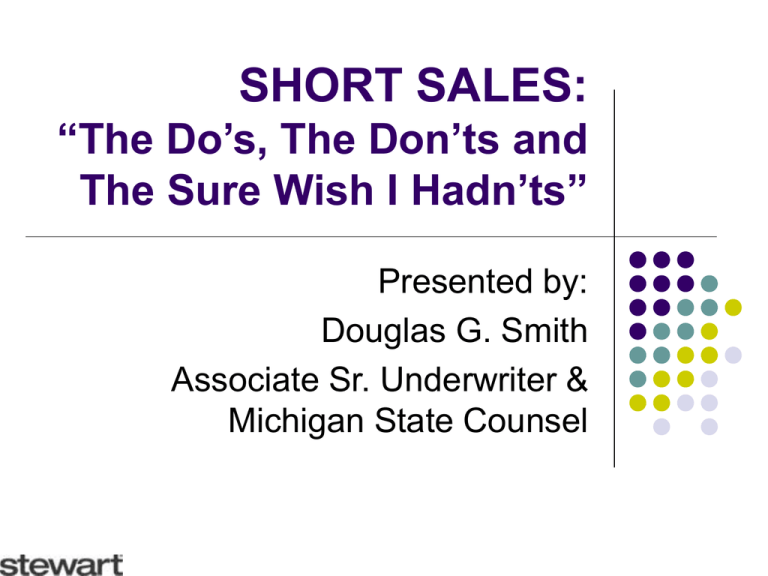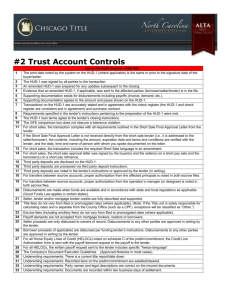SHORT SALES: “The Do`s, The Don`ts and The Sure Wish I
advertisement

SHORT SALES: “The Do’s, The Don’ts and The Sure Wish I Hadn’ts” Presented by: Douglas G. Smith Associate Sr. Underwriter & Michigan State Counsel Definition A transaction wherein an underlying lender(s) agree to accept a reduced payoff amount rather than the actual amount of the indebtedness to enable their borrower (distressed seller) to sell the subject property. Market Conditions As the result of the following, there has become a profound increase in mortgage foreclosures coupled with a decrease in borrower ability to redeem: The downturn in the economy Depreciation of property values Variable interest rate mortgages Negative amortization 100%(+) loans Decrease in availability of sub-prime loans The Lender Dilemma Lenders, having bursting inventories of properties, sustain significant carrying costs in maintaining foreclosed property because of: Property taxes Homeowner’s/liability insurance Heat/utility expense Vandalism repair Property depreciation Loss Mitigation Departments To avoid this overhead, lenders maintain a department which will entertain offers by borrowers to discount the amount of the loan when the borrower is attempting to sell the property: a short sale. Two-Party Transactions Property owners, or their Agent (Negotiator), negotiate a short sale transaction by contacting the Loss Mitigation Department of the lender and petition the lender to take a lesser amount in satisfaction of the loan to enable the sale of the property because the market sales price will not be sufficient to fully retire the indebtedness. Two-Party Transactions The lender will secure a Broker’s Price Opinion (BPO) to determine what the current market value of the property is. The property owner will be required to provide the lender, among other documentation, a purchase agreement showing the value of the negotiated sale. Two-Party Transactions The lender finalizes an amount that they are willing to take and provides a discounted payoff letter to facilitate the sale. [Review the payoff letter carefully to diagnose unacceptable conditions allowing the lender the ability to later reject tender of the funds.] Two-Party Transactions The lender will stipulate in the payoff letter that the borrower/seller is not to receive any proceeds of the sale. [Note: beware of seller concessions, if any, and verify that the lender approves those prior to closing.] Two-Party Transactions An important element of the transaction is that there should be zero or negative equity in the borrower/seller in the property. This can be determined by comparing the actual or “gross” amount of the indebtedness to the ultimate sales price. Two-Party Transactions The sale must be an “arms-length” transaction (preferably involving a realtor) to avoid a subsequent attack on the transaction by the underlying lender that there was inadequate consideration for the sale. [Sales to a family member or related entity would not constitute an arms-length transaction.] Two-Party Transactions If the transaction involves a “negotiator” who acts on behalf of the borrower, you should assure that there is a line item on the HUD showing the payment of the negotiator’s fee. [Lenders will likely place limits on the amount of the fee that can be collected.] Two-Party Transactions Be aware that if there are subordinate mortgages/liens against the property, those lenders/creditors must be approached, payoff letters secured and the lenders/creditors must be paid as a part of the work out of the sale. Three-Party Transactions Some negotiators/interveners choose to take control of the transaction by having the distressed property owner convey title into the Intervener, or the owner’s own beneficial land trust, where the negotiator/intervener acts as the trustee. Typically, the negotiator acts through an LLC entity. [Note: There are many variations of this procedure…assignments of trust interests, etc…] Three-Party Transactions The negotiator/trustee/intervener will assume the role of finding a new purchaser and begin negotiations with the underlying lender(s) to discount the mortgages so that a sale can occur. The negotiator will provide a purchase agreement to the lender reflective of the transfer of the owner’s property into the LLC or into the land trust, treating this transfer as a conveyance transaction. [Note: The amount of the consideration reflected on this purchase agreement is intentionally priced below the true market value of the property.] Three-Party Transactions The negotiator and the lender use this purchase agreement to begin the negotiation process to establish a payoff amount. The negotiator in the meantime secures a purchaser and enters into a purchase agreement with that 3rd party. Three-Party Transactions The closing then, typically, involves the two consecutive transfers: the first is the transfer from the distressed owner to the LLC or land trust and the second, a sale from the trust to the 3rd party, with funding for the payoff of the underlying mortgage coming from the proceeds of the “second sale”. Three-Party Transactions The purchase amount of the second leg actually reflects the market value of the property, which sum is hidden from the underlying lender so that the negotiator can earn more than just the “fee” charged (and approved by the lender) in the 2 party transaction. This transaction potentially engenders two types of exposure. Fraud “Equity Skimming” is a term used to describe a fraud perpetrated on the seller of distressed property wherein the negotiator induces the short sale borrower/seller to transfer the property to them/LLC and then sell the property to a 3rd party, taking (skimming) the seller’s equity out of the property as a part of their commission. Fraud “Flips” is a term used to describe a double sale transaction designed to artificially inflate the value of the property to make the lender loan money at a favorable interest rate where there is no equity in the property or worse, where the property is so overvalued that the borrower has no intention of even making a payment on the loan. Problems with 3-party Transactions The sole purpose of doing a 3-party transaction is to hide the ultimate sales price from the short sale lender thereby concealing the true market value of the property. The purchase agreement provided to the short sale lender is done solely to distort the value of the property to begin the negotiations. Problems with 3-party Transactions There are other “escrow related” irregularities that can arise with these transactions, such as excessive charges for unnecessary document preparation for the assignments of interests (to the trust or from the trust to beneficial owners) in the transfer process. Lawsuits have begun to spring up brought by short sale lenders against parties to 3-party transactions for fraud. Problems with 3-party Transactions FNMA and FHLMC insured loans create their own problems. These two entities have shown a reluctance to accept payoffs on 3-party transactions where they are the recorded, or unrecorded, interest holder in the mortgage. One may find out after negotiating with the lender that the lender was merely the servicer for FNMA or FHLMC and, without their approval, too, the funds may be rejected “after” closing and now you have a problem. Problems with 3-party Transactions The Company is not interested in insuring 3party short sale transactions whether directly, or in a split closing, and to insure a 3-party transaction, written approval from the legal department is required. Stewart Bulletin MI2010002 General Problems with Short Sales Be aware of payoff letters from the short sale lender conditioning the acceptance of funds: subject to final audit language, etc… Junior mortgage holders or lien claimant’s interests must be addressed even if foreclosure has occurred and a sheriff’s deed is recorded. General Problems with Short Sales Bankruptcy proceedings for the seller require approval of the bankruptcy court (potentially a court order and a deed from the bankruptcy trustee). [Note: Securing a lift of automatic sale by the lender does not “authorize” the sale.] General Problems with Short Sales Review pay off letters for restrictions on subsequent sales prohibiting the transfer of the subject property for a period of time. An exception on title would be required. General Problems with Short Sales Acting as an intermediary or negotiator: Please be advised that Agents/Affiliates and their employees are not authorized to act as a negotiator on behalf of Stewart Title. We would highly discourage anyone from actually negotiating on behalf of the borrower to secure a discounted amount for the payoff from the short sale lender. This engenders significant liability for the individual and the Agent. [Lawsuits are springing up around the Country by the property owners against their negotiators for negligence in not securing releases of personal liability under the note, etc…] Stewart Bulletin SLS2011007 and SLS2009005 Thank you for attending! Questions? Please contact: Douglas Smith 248-368-9900 ext. 107 Doug.smith@stewart.com











